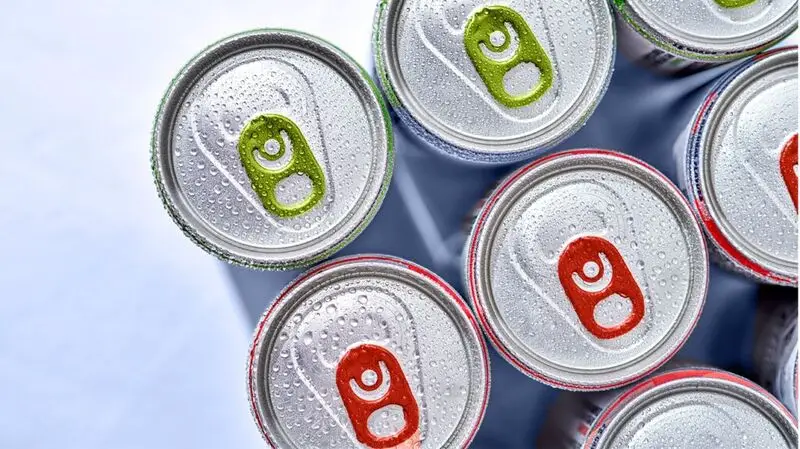- Diet versions of beverages are often hailed as Healthier than the sugar-sweetened original versions.
- Research is ongoing regarding the potential dangers of sugar-sweetened and artificially sweetened drinks.
- Recent study results identified a link between drinking higher amounts of sugar-sweetened beverages and low or non-sugar-sweetened beverages and an increased risk for metabolic dysfunction-associated steatotic liver disease (MASLD).
A recent study focused on how sugar-sweetened and low or non-sugar-sweetened beverages related to liver health. Based on analysis of over 103,000 participants, higher consumption of both beverage types was linked to a higher risk for MASLD.
Additionally, low or non-sugar-sweetened beverages were linked to a greater risk for liver-related mortality. While the study hasn’t been published yet, the findings shed light on the potential risks of these beverages, particularly low or non-sugar-sweetened beverages.
The study results were presented at UEG Week 2025, the annual congress of United European Gastroenterology. They are yet to appear in a peer-reviewed journal.
This study was a prospective cohort study where researchers used data from the UK Biobank. Researchers examined data from 103,251 participants who did not have baseline liver disease. The median follow-up was a little over 10 years, and during this time “949 participants developed MASLD, and 103 died from liver-related causes.”
Participants reported on their consumption of sugar-sweetened and low or non-sugar-sweetened beverages. Researchers were also able to consider participants’ liver fat content based on MRI data.
Researchers looked at the associations between drinking these beverages and someone’s risk for MASLD. They also looked at liver-related mortality and liver-fat content and their association with the related beverages.
Consuming more than 330 grams (g), or about 1 can, of drinks from either beverage category daily was associated with a higher risk for developing MASLD.
Sugar-sweetened beverages were associated with about a 50% greater risk for MASLD, and low or non-sugar-sweetened beverages were associated with 60% greater risk. The results also found that consuming either beverage type was linked to liver fat content.
At the same time, drinking low or non-sugar-sweetened beverages was associated with an increased risk for liver-related mortality, but sugar-sweetened beverages did not have a significant association.
The researchers also found that the association between low or non-sugar-sweetened beverages and liver-related mortality was dose-dependent; drinking more was linked to a higher risk.
When looking at substituting beverages, researchers found that switching out 330 g of either beverage type daily for water helped to decrease risk for MASLD.
The effect was a little larger when switching out sugar-sweetened beverages for water, which decreased MASLD risk by 14.7%.
Researchers found that switching out the beverage types for each other did not change the risk for MASLD.
The findings highlight the potential danger of both beverages, but particularly low or non-sugar-sweetened beverages, on liver outcomes.
Study author Lihe Liu, a graduate student in the Department of Gastroenterology at the First Affiliated Hospital of Soochow University in Suzhou, China, explained to Medical News Today that:
“Our research shows that low- or non-sugar-sweetened beverages (LNSSBs), often seen as healthier alternatives because they use sugar substitutes, may not be entirely risk-free. We found that frequent consumption was still linked with liver health risks, which challenges the common belief that these drinks are completely ‘safe’ or ‘healthy’ substitutes for sugary beverages.”
The full study has not been published in a peer-reviewed journal yet, which makes it challenging to know the full limitations of the research. However, beverage intake was something reported by participants, which may not have been their true intake.
The data also does not establish that consumption of these beverages causes liver problems. It’s also unclear what covariates researchers adjusted for in their analyses.
The UK Biobank is has its own limitations too, including the fact that it includes primarily white participants, and they tend to be healthier than the United Kingdom’s general population. For this reason, additional follow-up research will be helpful.
Study author Liu explained the next steps to MNT, saying that:
“The next step is to complete and submit the full manuscript for peer review and publication, which will allow the scientific community to scrutinize and build upon our findings. Looking ahead, more research is needed to clarify the biological mechanisms linking artificially sweetened beverages to liver disease, and to explore whether different types of sweeteners carry different risks. Long-term studies in more diverse populations will also be important to strengthen the evidence base.”
While more research is required, the findings do give another reason for avoiding drinks like soda and their diet counterparts. It also highlights that opting for water instead may help to decrease MASLD risk.
“Our findings indicate that both sugary and artificially sweetened drinks may carry risks for liver Health. Clinically, this highlights the need to guide people toward Healthier beverage choices, with water remaining the safest and Healthiest option,” Liu explained to MNT.
Registered dietitian nutritionist Karen Z. Berg, MS, RD, CSO, CDN, who was not involved in this research, advised that:
“Many people have the misconception that diet drinks are healthier for you than regular drinks, but this study demonstrates how both are positively associated with MASLD. I highly encourage all patients to stick with water, or carbonated water, for the best health outcomes. Just because something says ‘zero calories’ or ‘less sugar’ [it] does not automatically equate with [being] healthier. There are a lot of chemicals that go into those beverages to give them the flavors people crave. Plain water, fruit infused water (homemade), unsweetened homemade iced tea, or seltzer [are] the way to go.”






